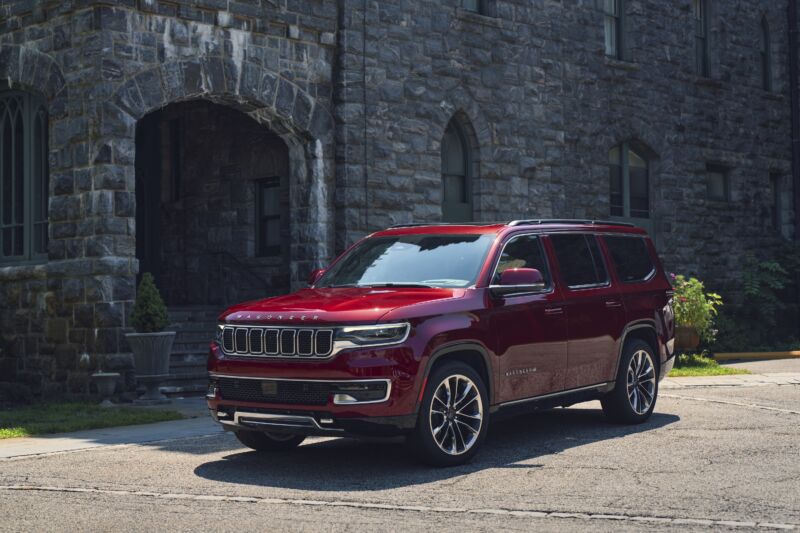
Even as the automotive industry charts a course into a mostly electrified future, internal combustion engines still rule the roost in most segments. This includes the full-size SUV segment dominated in the US by the Chevy Tahoe and Ford Explorer. Although Jeep parent Stellantis forecasts having 40 percent of its sales come from BEVs by the end of the decade, it needs to challenge GM and Ford with its own three-row SUV: the all-new Wagoneer.
Starting at $71,845 for the base model, this is not your father’s Jeep Wagoneer. While the grille screams Jeep, that word doesn’t actually appear on this massive SUV. Instead “Wagoneer” appears in numerous spots inside and outside. And it is truly massive—the Grand Wagoneer measures a whopping 215 inches (5,461 mm) from head to tail, a couple of inches longer than the competition from GM and Ford.
-
Smooth sailing on smooth pavement.Stellantis
-
You won’t find the word Jeep on the exterior of the Wagoneer.Stellantis
-
It’s definitely a Wagoneer.Stellantis
To propel this beast of an SUV, Jeep has gone with a 5.7-liter V8 with eTorque (a 48 volt battery-powered motor generator designed to help with performance and fuel economy) and an eight-speed automatic transmission. Although it uses the same box-on-frame design as the Ram pickup truck, the rear-wheel drive Wagoneer’s independent suspension gives it a much smoother ride than the Ram 1500 with its solid rear axle. The upside is nearly 10,000 pounds (4,500 kg) of towing capacity, surprisingly quick acceleration, and smooth rides on the highway. The downside of this combination of power, weight, and size? Disappointing mileage. The EPA estimates 15 mpg in the city, 20 mpg on the highway, and 17 mpg overall. Our week of late fall driving resulted in just 13.5 mpg. (This is a reminder that it’s not just EVs that lose range in cold weather.)
The interior is both spacious and refined. The $82,925 Series II we tested came with captain’s chairs in the second row and a third row bench. There’s plenty of legroom in the front two rows, and the third row is less bad than other SUVs in this segment. Where the Wagoneer really stands out from the competition is in the look and feel of the interior. The wood veneers, leather upholstery, and overall interior refinement had me double-checking the paperwork to see if I had gotten a $90,000+ Grand Wagoneer.

Uconnect, the Jeep/Chrysler/Dodge infotainment system, has gotten a long-overdue update. Version 5 has an all-new UI that looks dandy on the Wagoneer’s 10-inch center display along with wireless CarPlay and Android Auto support. Combined with the 10.25-inch digital instrument cluster and an optional passenger display, you can have a full 30 inches of screens in the front row. With built-in 4G connectivity, passengers can stream TV shows and movies via the Wagoneer’s built-in Fire TV for Auto integration.
-
Wagoneer interior complete with moonroof.Stellantis
-
The 2022 Wagoneer has heated and ventilated front- and second-row seats.Stellantis
-
The Wagoneer’s 10.25-inch frameless digital cluster showing a full-screen, turn-by-turn navigation map.Stellantis
On the road, the Wagoneer shines on open stretches of highway, offering up an almost posh ride. Rough city streets are another matter, with a bit too much information about road conditions being transmitted through the suspension to the occupants. To no one’s surprise, the Wagoneer can feel top-heavy on winding roads.
Kia and Hyundai pioneered what I like to call the “unexpected luxury SUV,” where the level of trim and number of included features is surprisingly high for a mainstream vehicle. Stellantis has been taking notes, and it shows with the Wagoneer. It’s no Cullinan, but the cabin is almost beyond reproach when it comes to style and comfort. The Wagoneer does come up short on fuel economy, and the ride could be a bit better on rough pavement, but as a mainstream, full-size SUV, it stacks up very nicely against the competition.
https://arstechnica.com/?p=1825365

